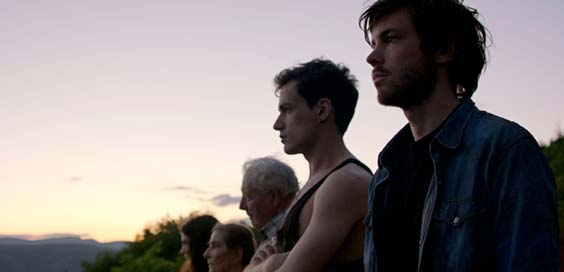Metamorphoses (2014) – Film Review

Director: Christophe Honore
Cast: Amira Akili, Sébastien Hirel, Damien Chapelle
Certificate: 15
by Gregory Fishwick
As a sometime member of the movement dubbed by the French cinematic press as cinema du corps/cinema of the body, it was perhaps only a matter of time before Christophe Honore decided to tackle Ovid’s epic poem Metamorphoses, a tale of men, Gods and various forms of bodily transformation.
The old world myths are, of course, updated and relocated to contemporary France. Honore has been careful in his choice of locations, opting for neither an Eden-like natural setting (despite a number of uses of stark Biblical imagery) nor a contemporary commentary-baiting concrete jungle; more for somewhere in-between. Unassuming fields, lakes and woodland areas lie on the cusp of car parks, council estates and trucker’s layovers and we dip into all of them. These are locales nearly everyone is familiar with and the film has a very everyday feel to it. This also extends to the cast; a nondescript lineup of bland types with frequently exposed bodies of varying droopiness.
“Challenging endeavour”
Presumably this approach has something to do with rooting the fantastical story in the real world. Admittedly, the real world is often dull and ugly and if it was Honore’s intention to reflect this, congratulations to him, but it doesn’t alter the fact that it’s an uninviting viewing experience. Moreover, ironically, the film is prevented from having any modern connotations by Honore’s choice of maintaining a classical bent on the dialogue, with the cast’s constant referrals to Gods, Goddesses, Mortals and the like coming across as stilted and affected.
Adapting a work of the ancient world and bringing it into the modern era is always a challenging endeavour. Honore has failed in this venture. Ovid’s writings are beautiful, playful, sometimes mischievous; Honore’s film is humourless, flat and grey.
The most curious aspect of the piece is why he chose the material at all. What is he trying to say with it? The answer is anyone’s guess, as searching for resolutions in this sequence of pedantic, staged vignettes is like staring into a vacuum. Honore is not unskilled at filmic adaptations of literary works, as his startling take on Georges Bataille’s Ma Mere (2004) can stand as testimony to. A far more bracing experience, both intellectually and viscerally, will be had by watching that. Or, indeed, by reading Ovid.
3/10










